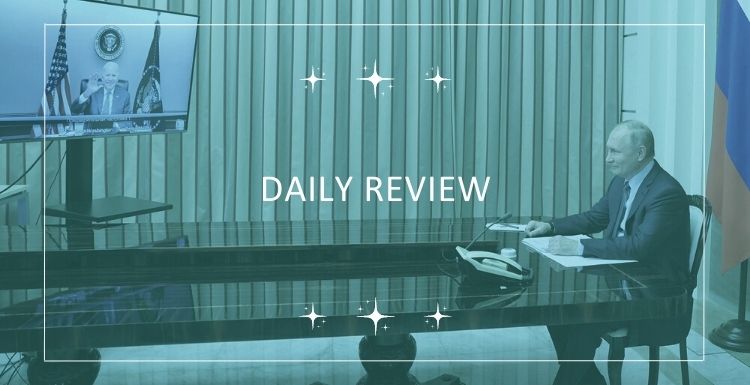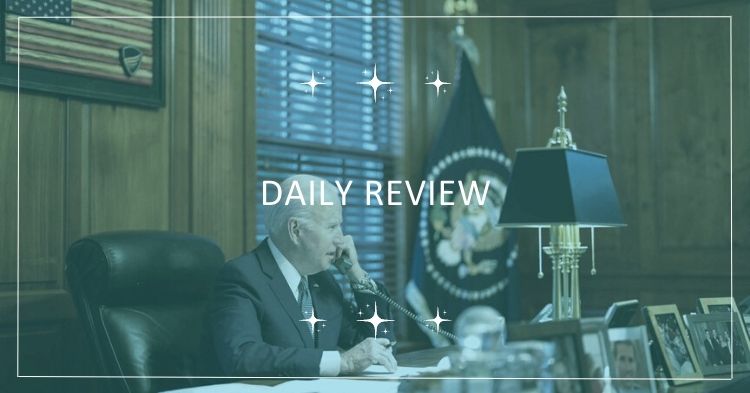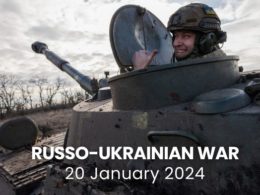Short fire
Russian-backed militants launch 6 attacks on Ukrainian positions in Donetsk, Luhansk, and Mariupol sectors, including heavy artillery and weapons banned by Minsk.
Between evenings of Dec 3-5, OSCE SMM recorded 153 violations, including 28 explosions in Donetsk Oblast; 43 violations, including 12 explosions in Luhansk Oblast.
Russian-led militants deny OSCE SMM passage 3 times near Stanytsia Luhanska and Zolote, Luhansk Oblast.
President Zelensky and Secretary of State Blinken agreed on positions ahead of today’s video call between US President Biden and Russian President Putin.
Against the background of the probable Russian offensive, Minister of Defense Oleksiy Reznikov urges Pentagon to supply additional weapons, incl those earmarked for Afghanistan & US-owned Mi-17 helicopters.
Ukraine is ready to launch domestic production of combat drones, says Zelenskyy.
Leader of French far-right party National Union Marine Le Pen says NATO is not able to accept new members & Türkiye must be expelled first.
Biden-Putin call
US President Joe Biden and Russian President Vladimir Putin spoke for about two hours over a secure video call on Tuesday in what had been expected to be a highly consequential meeting for the two leaders amid escalating tensions between Russia and Ukraine. A laconic readout published by the White House states that “President Biden… made clear that the US and our Allies would respond with strong economic and other measures in the event of military escalation.”
The White House readout of the Biden-Putin call: "President Biden made clear that the U.S. and our Allies would respond with strong economic and other measures in the event of military escalation"https://t.co/ieHDnRXfCd pic.twitter.com/FSwodIPKII
— Euromaidan Press (@EuromaidanPress) December 7, 2021
Meanwhile, the Kremlin published its readout more than an hour later, which is unusual: usually, Russia is the first to report its version of events, calling the conversation “frank and businesslike.” According to the Kremlin, the call was mostly dedicated to problems related to the “internal” Ukrainian crisis and the lack of progress in the implementation of the 2015 Minsk agreements, which he claimed, true to Russian rhetoric, were a result of “Kiev’s provocative actions against Donbas” and “complete dismantling of Minsk agreements.”
“It is NATO that is making dangerous attempts to conquer Ukrainian territory (sic!) and is building up its military potential at our borders” said Putin and dropped the ultimatum he put forward on 1 December: to obtain “legally fixed guarantees” that exclude NATO’s eastward movement. It is not the first time Putin has made this demand. Statements of the Russian President reiterated year after year make clear that the issue of NATO enlargement is a matter of special importance, as experts have told us before.
“The leaders agreed to instruct their representatives to engage in substantive consultations on these sensitive issues” says the Kremlin’s readout; the leaders agreed to cooperate on fighting cybercrime and the Joint Comprehensive Plan of Action on the Iranian nuclear program.
Putin finishes by proposing that the White House nullify “large-scale restrictions, bans and mass expulsions of Russian diplomats” over the last five years.
In fact, five years ago, in 2017, it was Russia that expelled 755 US diplomats after a new round of US sanctions.
Prior to the call, US President Biden had held a call with France, the U.K., Italy, and Germany. President Zelenskyy had agreed on positions ahead of the call with Secretary of State Blinken.
Speaking at a briefing after the video call, National security advisor Jake Sullivan said that Ukrainian President Zelenskyy will talk with US President Biden on Thursday. At the same time, Sullivan informed that Biden had already spoken to the leaders of France, Germany, Italy, and the UK to brief them on the call. He also hinted Ukraine is working on some proposals in order to find a diplomatic solution to the crisis.
Here are Sullivan’s statements in brief, as per CNN.
- Biden reiterated America’s support for Ukraine’s sovereignty and territorial integrity;
- US administration still believes Putin has not made a decision on whether to launch a military offensive against Ukraine;
- Sullivan signaled that the US sanctions should Russia invade Ukraine (again) would be larger than the ones in 2014, saying “that things we did not do in 2014 we are prepared to do now”;
- Sullivan did not go into specifics but added that the US is coordinating with European allies “at a deep level of specificity”;
- Sullivan said that apart from economic measures, the US is prepared to bolster defense capabilities in the region and “provide additional defensive material to the Ukrainians above and beyond that which we are already providing, and we would fortify our NATO allies on the eastern flank with additional capabilities in response to such an escalation.”
What could the sanctions include? Reuters reported, citing its sources, that they could include:
- targeting Putin’s inner circle (but no decision has yet been made);
- sanctions against the biggest Russian banks, and curbing the conversion of roubles into dollars and other currencies, were also being considered;
- US officials have told members of Congress they have an understanding with Germany about shutting down the Nord Stream 2 pipeline project if Russia invades Ukraine, a senior congressional aide said;
- Washington could target the Russian Direct Investment Fund as well;
- CNN reported that sanctions could include disconnecting Russia from the SWIFT international payment system used by banks around the world, an extreme step that would likely require coordination with allies. German Gref, the chief executive of Russia’s largest bank Sberbank, called that idea “nonsense” and “impossible to execute”;
- The US evaluated the possibility of curbing investors’ ability to buy Russian debt on the secondary market, a measure that even if taken only by Washington was seen as having a severe impact on Russia’s government — however, as listed below, this measure was stripped from the defense budget.
Latvia’s Foreign Minister has said that a quick reprisal package against Russia – including US troops and Patriot missiles stationed in the Baltics, the cutting off of Russia from the SWIFT banking payments system and reinstated sanctions on the Nord Stream 2 gas pipeline – must be prepared now in case it invades Ukraine.
US Congress strips anti-Russia measures from its defense budget
The US Congress removed a provision that would have imposed sanctions on those involved with building or financing Nord Stream 2, provisions banning Americans from shopping for Russian sovereign debt, and sanctions on 35 Russian individuals from the draft defense budget.
The proposed text of the US National Defense Authorization Act (NDAA) was published right after the call between Biden and Putin.
The two anti-Russian measures, initially proposed by the Democrat-dominated House, weren’t included within the new draft.
Senator Ted Cruz (R-Texas) had insisted on sanctions in opposition to Nord Stream 2 and even threatened to dam confirmations of Biden administration appointees until the sanctions modification was added to the bill and put up for a vote.
Sanctions expert Maria Shagina also noted that the new NDAA contains no provision on considering sanctions on Russian kleptocrats and human rights abusers. However, she does specify that the sanctions could be imposed through other means like Executive Orders and the Global Magnitsky Act.
Shagina noted it seems “indicative that after the NDAA was stalled for so long, the version was reconciled after the Biden-Putin call.”
https://twitter.com/maria_shagina/status/1468305040062484505
However, the 2022 NDAA does include $300 million for the Ukraine Security Assistance Initiative, which gives help to Ukraine’s armed forces, $4 billion for the European Defense Initiative, and proposes $150 million for Baltic safety cooperation.
The newest version of the defense spending legislation will still have to pass both the House and Senate to make it to Biden’s desk.
USA to urge Germany to halt Nord Stream 2 if Russia invades Ukraine
The United States will push Germany to agree to shut down the Nord Stream 2 gas pipeline project if Russian President Vladimir Putin dares to invade Ukraine, Bloomberg reported.
The administration of President Joe Biden is demanding the new German government stop the project in such circumstances, said one of the interlocutors of the publication. The future Vice-Chancellor of Germany and head of the Ministry of Economy and Climate Robert Habeck stated on Tuesday that the use of Nord Stream 2 to deter Russia is possible; that while it still has not been certified, a “political discussion” will be conducted around it on the background of the escalation against Ukraine.
Germany’s new government is expected to be approved on December 8. The parties that formed the new German coalition did not mention the pipeline in the coalition agreement.
NATO Quint urges Russia to resume Normandy talks
The leaders of the US, Germany, France, Italy, the UK have urged Russia to de-escalate tensions with Ukraine and resume talks between Russia and Ukraine in the Normandy format, the last of which took place in December 2019.
Leaders of NATO Quint call on Russia to resume negotiations in Normandy format
In Ukraine
Russia’s hybrid army’s training ground in Donbas located
Journos from Donbas Realii have pinpointed the location of Russian-hybrid troops’ tank drills in occupied Donbas
Journos pinpoint location of Russian-hybrid troops’ tank drills in occupied Donbas
Russia’s hybrid energy offensive
Russia has halted coal and electricity imports to Ukraine starting from 1 November, along with critically limiting gas transit heading towards zero. Energy is the first lever that Moscow can apply to destabilize Ukraine internally, if it indeed plans to attack this winter, as multiple warnings from NATO and Ukrainian intelligence suggest. However, in the last eight years, Ukraine has made great efforts in limiting its dependence on Russian energy.
Triple disconnection: how Russia seeks to destabilize Ukraine’s gas, electricity, and coal markets
Ukrainian political prisoner’s drawings from Russian captivity go on display in Berlin. An exhibition has opened in Berlin of the works of Viktor Shur, a Ukrainian political prisoner, incarcerated in Russia since December 2014. Shur is now 64, and forced, as his daughter Olha puts it, “to draw the life he is not living.”
Russia ramps up toxic hate speech as it escalates its attack on Crimean Tatars. Since the arrest in early September 2021 of Crimean Tatar Mejlis leader and journalist Nariman Dzhelyal, there has been a sharp escalation both in mass detentions, and in hate speech aimed at inciting enmity both towards the Mejlis, or self-governing body, of the Crimean Tatar people, and towards Crimean Tatars in general, writes Halya Coynash.
KyivStratComForum-2021 kicks off, where our editor-in-chief Alya Shandra will be moderating a panel tomorrow, 8 December, at 13:30.








